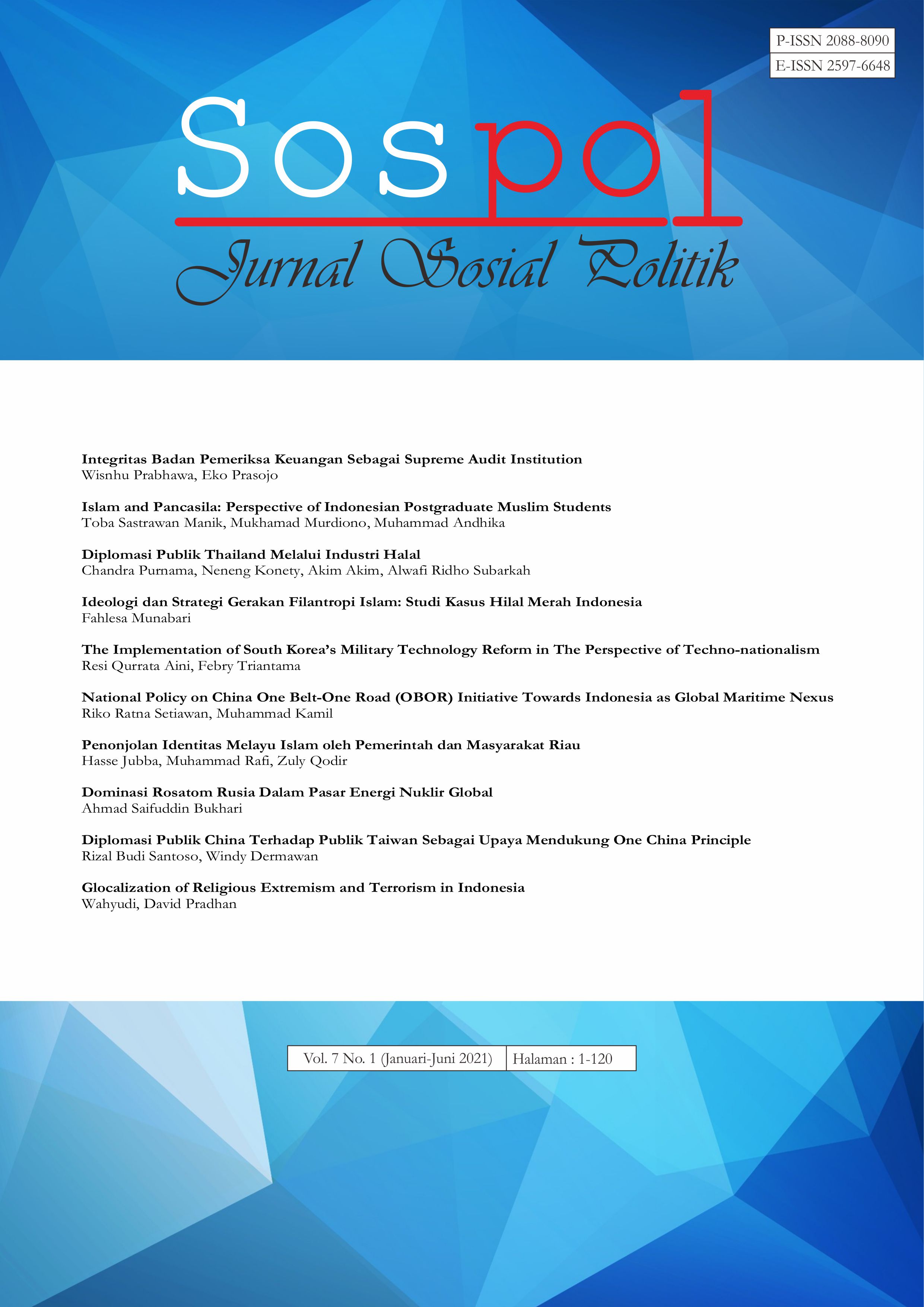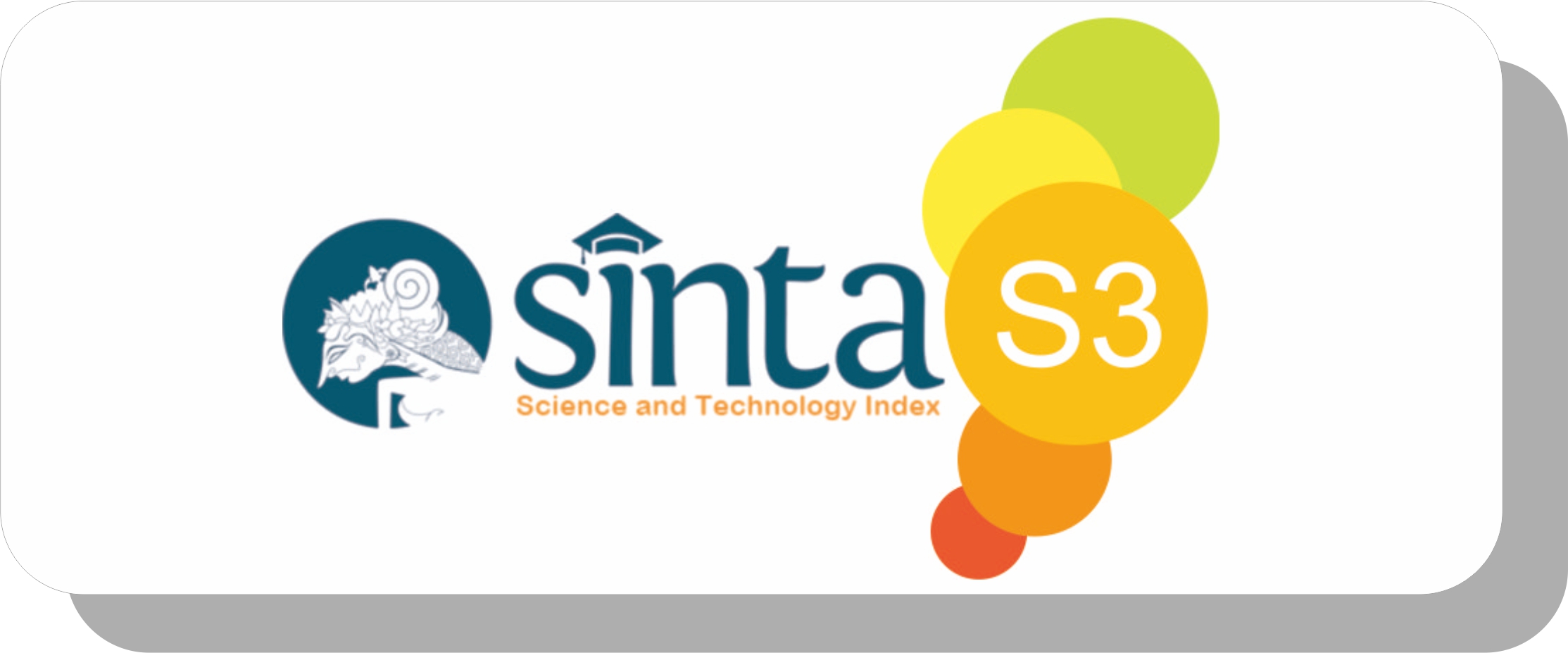Islam and Pancasila: Perspective of Indonesian Postgraduate Muslim Students
DOI:
https://doi.org/10.22219/sospol.v7i1.13511Abstract
Pancasila as the basis of the state faces debates from nationalists and Islamic ideology followers in Indonesia. This is influenced by the development of theorizing about secularism, nationalism and theocracy. Considering the threat to the rise of communism and radicalism, this study aims to analyze the attitudes of Indonesian Moslem postgraduate students towards the principles of Pancasila. The number of samples in this study were 122 people from various Indonesian universities who were determined by random sampling. The data was distributed via Google Form and processed qualitatively descriptively. This study found that the majority of postgraduate Moslem students accepted affection, cognition and conation of each Pancasila precept. The level of respondent acceptance of Pancasila was 70-90%. There were some people who still do not accept Pancasila as an ideology but it was only in small number, 2.45% for those who strongly disagree and 7.42% who disagree. Pancasila is accepted by most Indonesian Moslem postgraduate students. The results of the research contribute in providing a new understanding of Pancasila as well as the young generation of Moslem. However, there is many limitation in this research in reaching bigger and wider respondents. Further research on this topic is very welcomed.
Downloads
References
Alhoun, C. C., Mark J uergensmeyer, & AnAntwerpen, J. onathan V (Eds.). (2011). Secularism, Rethinking. Oxford University Press. http://medcontent.metapress.com/index/A65RM03P4874243N.pdf
Azwar, S. (2011). Sikap Manusia, Teori dan Pengukurannya. Pustaka Pelajar.
Bahtiar Effendy. (2011). Islam dan Negara: Transformasi Gagasan dan Praktik Politik Indonesia (Edisi Digi). Democracy Project.
Berger, P. L. (2012). Further Thoughts on Religion and Modernity. Society, 49(4), 313–316. https://doi.org/10.1007/s12115-012-9551-y
Blackford, R. (2012). Freedom of Religion and the Secular State (M. Boylan (Ed.)). Blackwell Public Philosophy. https://doi.org/10.1002/9781118153321
Boland, B. J. (1982). the Struggle of Islam (1lst editi). SPRINGER-SCIENCE+BUSINESS MEDIA, B.V. https://www.springer.com/us/book/9789024707812
Burhani, A. N. (2018). Islam Nusantara as a Promising Response to Religius Intolerance and Radicalism. Trends in Southeast Asia Series., 21, 2016–2019. https://doi.org/10.1063/1.4768720
Casanova, J. (1994). Public Religions in the Modern World. The University of Chicago Press. https://doi.org/10.2307/3711986
Dharmaputra, E. (1988). Pancasila: Identitas dan Modernitas = Tinjauan Etis dan Budaya. BPK Gunung Mulia.
DHF. (2018, March 7). Survei Alvara: Sebagian Milenial Setuju Khilafah. CNN Indonesia.
Eagly, A. H., & Chaiken, S. (2007). The advantages of an inclusive definition of attitude. Social Cognition, 25(5), 582–602. https://doi.org/10.1521/soco.2007.25.5.582
Elshtain, J. B. (2009). Religion and democracy. Journal of Democracy, 20(2), 5–17. https://doi.org/10.1515/jheec-2015-0002
Eugene, S. (1963). India as a Seculer State. Princeton University Press.
G, W. (2016). Relasi Islam Dan Politik Di Indonesia (Perdebatan Seputar Ideologi dan Konstitusi Negara Indonesia Merdeka). Jurnal Adaboyah, 16(1), 70–82.
Gerard Delanty. (2000). Modernity and Postmodernity : Knowledge, Power and the Self. SAGE Publications Ltd.
Hamdi, S. (2017). Conflicting Religious Identities : Blaspheming Islam and The Future of Democracy in Indonesia. Al Albab, 6(2), 247–262.
Hosen, N. (1996). Religion and the Indonesian Constitution: A recent debate. Past and Present, 36(3). https://doi.org/10.1017/S0022463405000238
Ilyas, I. (2020). Islam dan Kebangsaan: Pergumulan dalam BPUPKI, PPKI, dan Piagam Jakarta. Buletin Al-Turas, 26(1), 19–35. https://doi.org/10.15408/bat.v26i1.13921
Ira M, L. (1956). State and Religion in Islamic Societies. The Political Quarterly, 151(4), 4–27. https://doi.org/10.1111/j.1467-923X.1955.tb02587.x
Kaelan. (2016). Pendidikan Kewarganegaraan untuk Perguruan Tinggi. Paradigma.
Kuntowijoyo. (1997). Identitas Politik Umat Islam. Penertit Mizan.
Latif, Y. (2013). Genealogi Intelegensia: Pengetahuan & Kekuasaan Inteligensia Muslim Indonesia Abad XX. Kencana Prenada Group.
Latif, Y. (2015). Negara Paripurna : Historisitas, Rasionalitas, dan Aktualitas Pancasila (Edisi keli). Gramedia Pustaka Utama.
Maarif, A. S. (2006). Islam dan Pancasila sebagai Dasar Negara: Studi tentang Perdebatan dalam Konstituante. LP3ES.
Madjid, N. (2018). Indonesia Kita (Kedua). Gramedia Pustaka Utama.
Maksum, A. (2017). Discourses on Islam and democracy in Indonesia: A study on the intellectual debate between Liberal Islam network (JIL) and Hizbut Tahrir Indonesia (HTI). Journal of Indonesian Islam, 11(2), 405–422. https://doi.org/10.15642/JIIS.2017.11.2.405-422
Mar’at. (2006). Sikap Manusia: Perubahan serta Pengukurannya. Ghalia Indonesia.
Martin van Bruinessen. (2013). Contemporary Developments in Indonesian Islam Explaining the “Conservative Turn” (Martin van Bruinessen (Ed.)). ISEAS Publishing.
Mawardi, M. (2019). Rambu-rambu Penyusunan Skala Sikap Model Likert untuk Mengukur Sikap Siswa. Scholaria: Jurnal Pendidikan Dan Kebudayaan, 9(3), 292–304. https://doi.org/10.24246/j.js.2019.v9.i3.p292-304
Mubarak, Z. (2012). Fenomena Terorisme di Indonesia : Kajian Aspek Teologi, Ideologi dan Gerakan. Salam: Jurnal Studi Masyarakat Islam, 15(2), 240–254.
Munawar, B., & Rachman. (2011). Reorienrasi Pembaruan Islam: Sekularisme, Liberalisme, dan Pluralisme Paradigma Baru Islam Indonesia (Edisi Digi). Lembaga Studi Agama dan Filsafat (LSAF).
Mutiani, M. (2016). Reaktualisasi Pengamalan Nilai Pancasila untuk Demokrasi Indonesia. SOSIO DIDAKTIKA: Social Science Education Journal, 2(2), 176–183. https://doi.org/10.15408/sd.v2i2.2822
Natsir, M. (2014). Islam Sebagai Dasar Negara. Sega Arsy.
Payne, D. A. (1980). Recent developments in affective measurement. Jossey-Bass.
Pranarka, A. W. . P. (1985). Sejarah Pemikiran Tentang Pancasila. Center For Strategic And International Studies.
Rahman, A. (2015). Paradigma Kritis Pancasila dalam Dimensi Pendidikan Islam A . Pendahuluan Pancasila didengungkan sebagai ideologi bangsa sampai saat ini sangat memprihatinkan . Lebih dari separuh abad memerdekakan diri dari belenggu penjajahan kemudian berdirilah negara. Jurnal Edukasia: Jurnal Penelitian Pendidikan Islam, 10(1), 125–144.
Redaksi. (2016). Peneliti LIPI: Anak Muda Indonesia Makin Radikal.
Rofiq, N., & Bhakti, I. S. G. (2018). Persepsi Mahasiswa Aktivis Lembaga Dakwah Kampus Universitas Tidar tentang Empat Pilar Berbangsa dan Bernegara, serta Gerakan Islam Radikal. Ta’dib: Jurnal Pendidikan Islam, 7(2), 33–42. https://doi.org/10.29313/tjpi.v7i2.3989
Sahide, A., Cipto, B., Muti’ah Setiawati, S., & Hadi, S. (2015). The Arab Spring: Membaca Kronologi dan Faktornya Penyebabnya. Jurnal Hubungan Internasional, 4(2), 118–129. https://doi.org/10.18196/hi.2015.0072.118-129
Suryadinata, L. (2018). Pancasila and The Challenge of Political Islam: Past and Present (Issue 14, pp. 225–227). ISEAS Publishing.
Talal, A. (2003). Formations of the Secular: Christianity, Islam, Modernity. Standford University Press.
Wahyudi, A. (2006). Jurnal filsafat. Jurnal Filsafat, 16(1), 94–115. https://journal.ugm.ac.id/wisdom/article/view/31325/18921
Yasmine, S. E. (2015). Arab Spring : Islam dalam gerakan sosial dan demokrasi Timur Tengah Arab Spring : Islam within social movement and democracy in the Middle. Masyarakat, Kebudayaan Dan Politik, 28(2), h. 108.
Downloads
Published
How to Cite
Issue
Section
License
Copyright (c) 2021 Toba Sastrawan Manik, Mukhamad Murdiono, Muhammad Andhika

This work is licensed under a Creative Commons Attribution-NonCommercial-ShareAlike 4.0 International License.
Authors who publish with this journal agree to the following terms:
- Authors retain copyright and grant the journal right of first publication with the work simultaneously licensed under a Creative Commons Attribution-ShareAlike 4.0 International License that allows others to share the work with an acknowledgement of the work's authorship and initial publication in this journal.
- Authors are able to enter into separate, additional contractual arrangements for the non-exclusive distribution of the journal's published version of the work (e.g., post it to an institutional repository or publish it in a book), with an acknowledgement of its initial publication in this journal.
- Authors are permitted and encouraged to post their work online (e.g., in institutional repositories or on their website) prior to and during the submission process, as it can lead to productive exchanges, as well as earlier and greater citation of published work (See The Effect of Open Access).

This work is licensed under a Creative Commons Attribution-ShareAlike 4.0 International License.



















